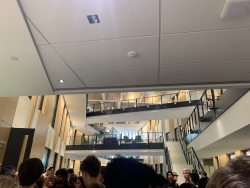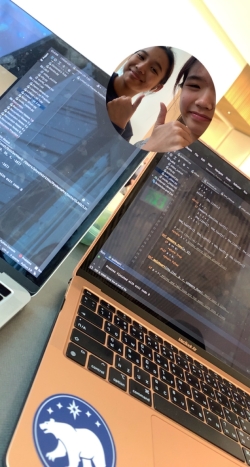

Memo Tangtipongkul


Fall Term: Computer Science Edition
During Dartmouth's 2-week-long Orientation period, I had the opportunity to visit each department's open house. I went to the Chemistry and QSS open houses since I have always thought of pursuing these two interests in college. With the intention to just explore other departments out of curiosity, I tagged along with a friend to the Engineering and Computer Science Center.

Now, I am the most indecisive person in the world, so any exciting factors can easily sway me. I've never thought about taking a computer science class in college ever. Let's just say my high school coding experience was not so enjoyable. However, the moment I stepped foot into the ECSC building, I was so mesmerized by its interiors. I wanted to come here every day and take all my 3 classes in this building. Of course, I knew I couldn't just choose my major from how amazing the buildings were, but computer science suddenly became an option.
Anyways, my friend and I roamed around the building for a while, asking professors questions about the courses and appreciating some free orange juice and donuts. One other student asked a professor to give us a pitch as to why we should pursue computer science. I remembered locking eyes with my friends after his speech, and we knew we were both heavily convinced. We had to take CS1.
Course elections rolled along and I ended up taking CS1. The first few weeks were a breeze, but things got real as we sped into the quarter. It requires a chunk of your time, and the assignments are there to make sure you've got a grip on the concepts in the lectures. It's definitely not a layup (easy, chill class), but I think the way Professor Vasanta teaches gave me a stronger foundation in computer science.

I realized that computer science started making a lot more sense to me, and I was excited to pursue it further. Wonderful opportunities emerged as I started looking into the WISP Research Internship Program. This program matches freshmen and sophomore women who are in STEM disciplines to faculty members for a paid, part-time internship. As I've mentioned, this is a matching program, which means that both the student and faculty members have to be interested in working together.
After attending 2 informational sessions, I applied to the program and emailed a few faculty members to ask for an interview opportunity. I had to do it as soon as possible since availability in each lab may be limited. Three interviews and long days of waiting later, I got a match! In the winter, I'll be working with Professor Lorie Loeb and my WISP teammates on a computer science project titled, 'DALI Lab mobile app design and development.' Can you guess where my meetings will take place for this internship? If you said the Engineering and Computer Science building, you are absolutely right.
So here's my rating for CS right now: so far so good. I am so thrilled and I can't help but wonder what winter term will bring. :
Posts You Might Like

Read more about the Spanish 9 Advanced Culture and Conversation class!


This summer, I chose to grow exactly where my story began—in Brasilia, Brazil.


Come learn about the classes I'm taking this summer!


My time at the MFA, completely free of charge!


At Dartmouth, students have the opportunity to fuse two different academic studies and programs into a single major. Learn more about my modified major here!


A look into my class Italian 85: Independent Reading and Research, focused on Italian Fascism.


Read more about the QSS 17 class!


Why the Dartmouth Greenhouse is my favorite campus escape


Dartmouth is known for its outstanding graduate schools of business, engineering, and medicine, but how can undergraduates take part in that enriching environment? Read more to find out!
